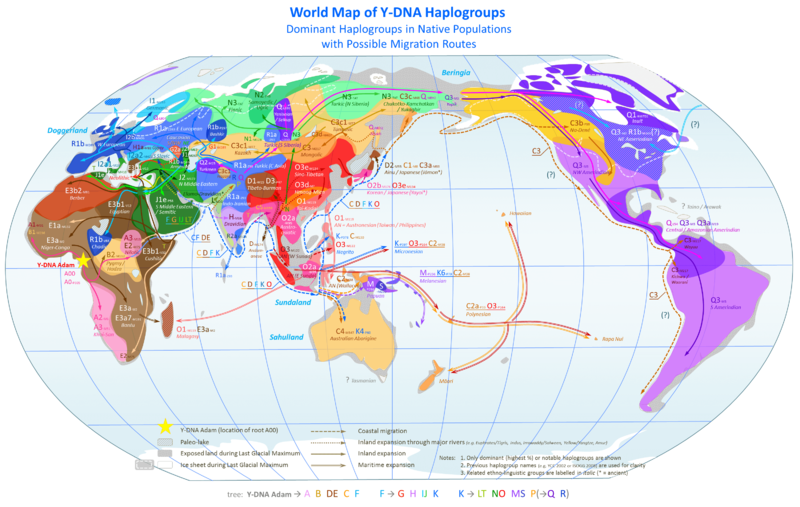Oh, what's in a gene? Consumer DNA kits and You
- Hannah
- Jan 31, 2018
- 3 min read

Direct-to-consumer DNA kits are a booming business these days. They sell a tantalizing idea: uncover your genetic past, track your ancestors’ migration around the world, and learn about your hereditary health, all without ever consulting a costly genetic specialist. Priced between $100-$200, these genetic testing kits are a popular gift for holidays and birthdays. But what, exactly, are we being sold?

Let’s start with a brief overview of genetics, as it’s important to understand how these gene kits provide you with your genetic history. We inherit half our genes from our biological mother, and half from our biological father. In simple terms, our DNA is a random sampling of all our parents’ genes. This keeps you and your siblings from being clones of each other, and ensures that all children are genetically diverse. Genetic diversity is important to survival: the more children a person has, the more of their genes are put into the world. Now, they have increased their chances of having of some of their children survive to have children of their own and pass down those genes again. Essentially, we as living beings are just vessels used to propagate the genes of our ancestors into the future.
The fun side effect of this process is that we are able to use our genes to project back into the past. If a subsection of your genes are from your great-great-great-great-great-great-great grandmother, your genome (the totality of the genes you possess) can be used to learn information about her: where did she come from, what other groups of people was she near, what was the path her descendants took to get to where you are now? We call genes like this haplotypes and haplogroups: genes or groups of genes inherited from a common ancestor to many people. Every region of the world is characterized by specific haplogroups shared among the descendants of that region.
Gene kits rely on haplotypes and haplogroups to assess the ancestry information they provide to their customers. A genetic testing company can tell your ancestry by looking at the haplogroups in your genome, even though you and your family may live far from where your ancestors called home. For customers whose families have a long history of migration, these kits can reveal unknown family roots. Customers may be surprised by the ancestry information they have received; afterall, written records may only go back two or three generations. Further back than that is a mystery only unveiled by genes.
Some stories are quite dramatic, such as that of Alice Collins Plebuch, who uncovered a surprisingly less-than-Irish genetic history in her supposedly full-blooded Irish Catholic family. For others, such as Nikiah Washington, it lead to a difficult reckoning with the trauma of slavery in her family tree.
For many people, however, their genetic history is a less of a blockbuster and more of a fun fact to share with family and friends. A quick search online brings up many forum posts of people finding small surprises hidden in their genes. Some of these surprises include genetic heritage that is different from what oral family traditions proclaim.
Now, let me stop you before you run off to your family with tales of ancient love affairs. Consumer DNA kits are sort of like taking a bite out of a cake with many different flavored layers - you won’t quite get the same bite each time. Take, for example, my own DNA results from two separate DNA kit companies:


If you play “spot the difference,” you’ll notice that one company found ancestry from southern Europe, but the other company did not. You’ll also notice that the percentages in each category differ between the two companies as well. This does not, however, mean that either company is necessarily wrong about my genetic ancestry. It means that the two companies looked at two different selections of my genes, resulting in two slightly different results. That one company missed the southern European ancestry is not terribly disturbing, since that ancestry only makes up roughly 2% of my genes. My family, in fact, cannot trace our line back to southern Europe in the family tree, so whoever my southern European ancestors were, they were from a long, long time ago.
These consumer ancestry kits are a wonderful invention for many people: from adoptees looking to uncover more about their biological family, to people finding lost half-siblings, to genealogically-minded folks seeking to confirm lineages in their family tree. Whatever your reason for pursuing your genetic ancestry, there is one important message to remember: your genes do not make up the entirety of who you are. You may find surprising ancestry in your genes, but that does not change your cultural heritage. These kits inform us on our past, but they do not dictate our present. Genetics can be earth-shattering for many, so go into it with an open mind, and take the results with a grain of salt.











Comments